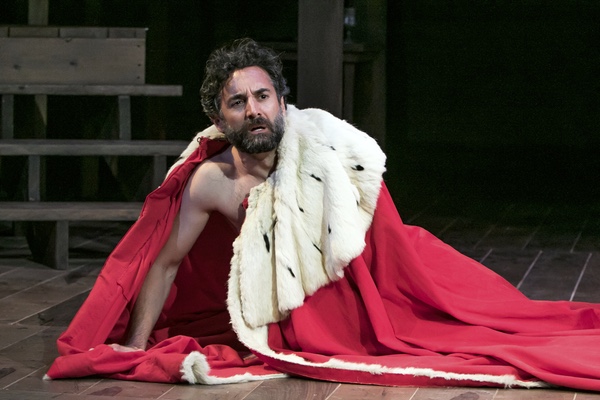This Play About the 1605 British Gunpowder Plot to Blow Up the King and the Parliament Mostly Hits the Target

What could be more historically interesting that a play about the well-known plot by Guy Fawkes and others to explode 36 barrels of gunpowder under the House of Lords and blow up the British Parliament and kill King James I in 1605? You have an assassination, mass murder, the destruction of the entire English government and conspirators under every rug in London. Terrific.
That’s what the King thought, too, and in Bill Cain’s play Equivocation, His Majesty and his aides order William Shakespeare to write a play about it. This is not just any play, though. In it, according to the King and his henchman, Robert Cecil, the men they named as conspirators were all guilty and engaged in various acts of treason that seemed a bit, well, invented. The real plot, that has been celebrated every year in Britain as symbolic of the start of modern British history, was murky enough. People did and did not say something, did or did not do something, maybe and maybe not met somewhere to plan something. Guy Fawkes was caught in the basement of Parliament with the gunpowder and the plot was halted. The King’s view of it is really murky, though quite patriotic, and it has a fine hero – the King.
Shakespeare bristles. He does not want to write a play that is not all true and he does not want to be pushed around by the Monarch. Many tell him just ‘equivocate,’ or bend the truth. What to do? Obey your King or your conscience? That is the gist of Cain’s play, that just opened at the Shakespeare Theatre of New jersey at Drew University, Madison.
Shakespeare fans will love this show. The Bard was so busy hating this play that he finished a little bit of drama he had been working on called Macbeth and hoped that it might work for local audiences. Cain suggests that without the gunpowder fiasco, Macbeth would never have been written.
Cain’s play is entirely made up. Shakespeare never did try to write such a play. It is solid historical fiction and pretty interesting material, though. Cain’s characters are quite believable and vibrant and the story is a good one. Shakespeare, called Shag in the play, really shines as heroic playwright and defender of personal nobility and conscience. The play discusses lying, malevolence and torture, and we certainly have plenty of that today.
You just wish the play about the Gunpowder Plot had more in it about the plot itself and the men involved in it. You meet a few of them, but the complexities of the plot are not revealed and you have no idea of how and why they formed their conspiracy and if they really thought it would work. There was a lot that could have been done with the history of the event, and the lives of the King and his heirs and the turbulent British conflicts, both political and religious, of that era. As an example, the conspirators (13 in all) were Catholics rebelling against a Protestant monarchy. A small group of men started the plot but their number soon tripled. Several were killed when chased after the plot was revealed a week before the planned explosion and the others were hanged. There were discrepancies in the story. The crown charged that the plotters had dug a tunnel under Parliament, but that was never proven. It was charged that the head of the Jesuits was in on it, but that was not established, either (even though they hanged him). The delivery of the barrels of gunpowder remained a mystery and the connection of Spanish conspirators did, also.
If you like Shakespeare and British history and don’t care if it is as deep as it might have been, you will still enjoy the play very much. As a straight play, irregardless of history, it is full of drama, laughter, family relationships and very good, throat slitting politics (the best kind on the stage, don’t you think?).
Director Paul Mullins has injected a great deal of tension into the play and from start to finish you root for Shakespeare to do the right thing and defy the King. Mullins gets superb performances from just about everybody in the play. James Michael Reilly is a wonderful Shakespeare, churning up with integrity and family conflict at the same time, a man above all others and yet a man, in scene after scene, a little too eager to please his London audiences with his work. Mullins also gets fine work from actors Domenic Comperatore, Matthew Stucky, Rob Krakovski, Kevin Isola Therese Barbato.
But, and a big ‘but,’ the play runs over two and a half hours. The last twenty minutes or so are taken up with a really needless and tedious effort to stage short snippets of Macbeth with a lot of winks and nods to those in the audience who have seen the play (or had to read it in high school). They could have cut all of that, and out with the three ghastly witches, too.
Without the last hopeless scene (that seemed four days long), the play would have moved along nicely and Cain would have made all of his points.
PRODUCTION: The play is produced by the Shakespeare Theatre of New Jersey. It was originally produced by the Oregon Shakespeare Festival and later the Manhattan Theater Club, in New York. Sets: Michael Schweikhardt, Costumes: Nikki Delhomme, Lighting: Michael Giannitti, Sound: Karin Graybash, Special Effects Designer: Paul Rubin. The play runs through October 4.